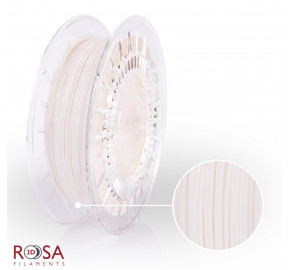



210.00 tax excl.

Odstapienie od umowy w terminie do 14 dni bez podawania powodu

Przedmioty dostępne na magazynie wysyłamy w dni robocze w przeciągu 24 godzin
Poliwęglan z teflonem (PC+PTFE) - techniczny materiał ślizgowy o wysokiej odporności temperaturowej. Przeznaczony do użytku przez profesjonalistów.
PC + PTFE filament (polycarbonate + polytetrafluoroethylene) is a technical material, for professionals. It is characterized by its high mechanical and thermal resistance.
The material is ideal for making parts with good dimensional stability that have to work at high temperatures. Elements printed from this filament can work in temperatures around 120°C. Due to low static and dynamic friction coefficients, it can be used in the production of sliding elements. Printouts made of PC + PTFE can be machined to obtain a perfectly smooth surface.
Recommended printing temperature 270-300°C.
Recommended table temperature: 90-120°C.
Recommended fan setting: 0-50% (depends on model geometry)
Compatible work surfaces: glass, smooth PEI, textured PEI.
Filament can be printed on both direct and Bowden drive printers. We recommend that you close the chamber. In case of problems with adhesion, we recommend the use of an adhesive spray. Due to the high printing temperatures, it will be necessary to install a full-metal heatbreak (no Teflon tube inside). We recommend drying the filament before printing at 110°C for at least 3 hours.
bushings
blocks
bearings
nuts
gears
sliding elements
elements with increased heat resistance
Diameter: 1.75 mm
Diameter tolerance: +/- 0.05 mm
Oval tolerance: +/- 0.02 mm
Net weight: 500 g
Print temperature: 270 – 300°C
Bed temperature: 90-120°C
Density: 1.32 g/cm3
Tensile strength (to break): 55 MPa (5mm/min, 23°C)
Tensile modulus: 2200 MPa (1mm/min, 23°C)
Thermal deformation temperature: 140°C (0,45 MN/m2), 130°C (1,81 MN/m2)
Vicat softening point: 145°C (50N, 50°C/h)
Charpy impact strength: unnotched, 23°C: 50,0 kJ/m2; notched, 23°C: 12,0 kJ/m2
Specific References